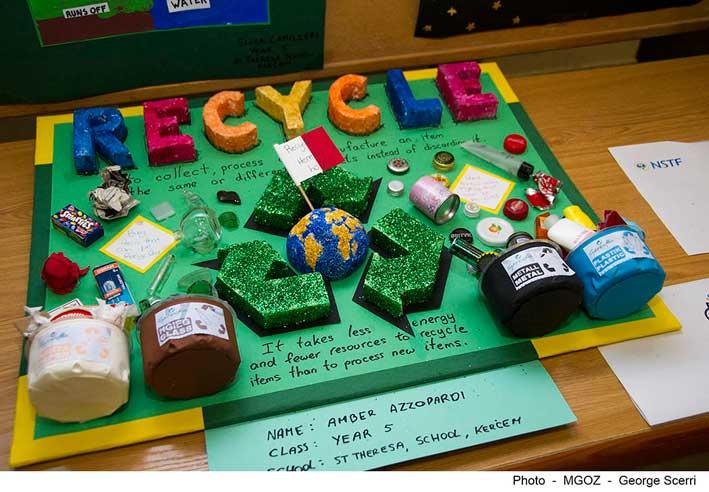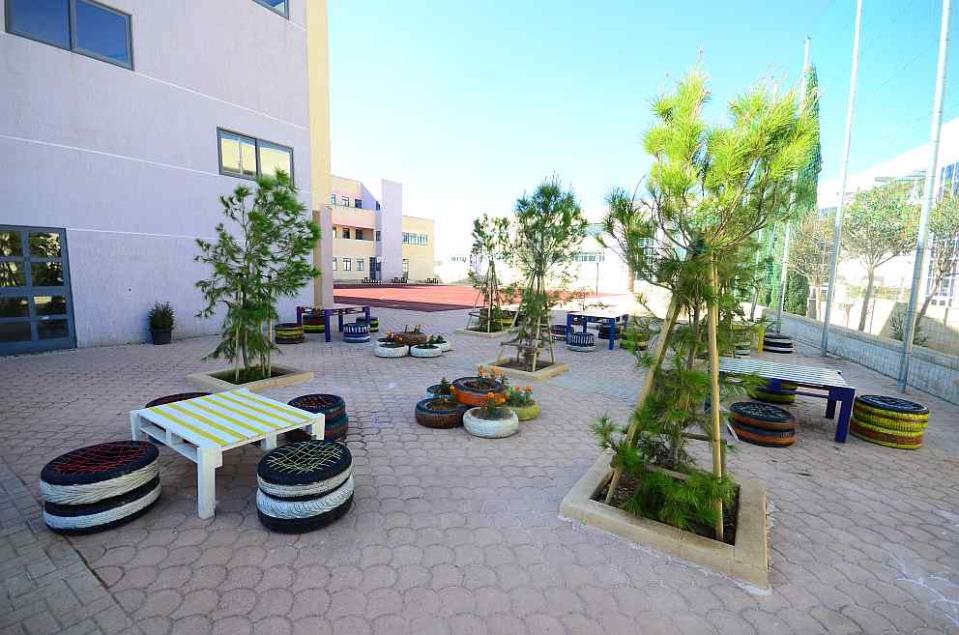Government’s push towards a circular economy comes amidst an EU-wide push for the same goal, and fears of Malta’s landfill reaching its limit. A circular economy aims to keep resources in use for as long as possible, extract the maximum value from them whilst in use, then recover and regenerate products and materials at the end of each service life.
The Malta Independent sat down with Sean Schembri, government spokesperson for the Environment, to discuss a couple of initiatives government has in the pipeline, to help clean up Malta. One such initiative is the Beverage Container Refund Scheme.
Schembri explained that the aim of the scheme is to help increase the amount recycled, and most importantly, to improve the quality of recycling. There are a number of models as to how this scheme could work, he said, adding that it forms part of the ongoing discussion. A public consultation is currently underway, and is expected to conclude by the end of June.
Such schemes incentivise the return of used beverage containers by applying a refundable deposit to beverage sales. These have been introduced in various countries around Europe, in certain Australian territories, US states and Canadian provinces to increase recycling rates and reduce litter.
The spokesperson explained that the producers and retailers will, for example, import the bottles from abroad, and would need to register them, be they plastic or glass bottles, or aluminum beverage cans.

All types of these containers, he said, would be registered with a council which will be set up to oversee the scheme, which would then issue a barcode for each beverage container included within the scheme. “When containers are returned to the reverse vending machines (where the said recyclable beverage containers can be deposited for recycling), the barcodes will be scanned to verify they are registered with the Council, and cross-referenced again with the container size, shape and material. The use of barcodes will enable the Council to collect data on the volume of sales and to compare these to the number of containers returned, so that they can identify any unusual patterns and high volumes of certain types of container that would indicate fraud,” the public consultation document reads. This means that the scheme would also include anti-fraud measures.
The proposed regulation sets out that the Council will provide a deposit refund logo that is to be stamped or affixed to all beverage containers included within the scope of the scheme. The labels will include the aforementioned barcode that is specific for the Maltese islands. A deposit on these beverage containers will then be charged to consumers who buy them, who will be able to get their money back after placing the bottles into reverse vending machines for recycling purposes.
The intention of the scheme is to incentivise the return of all such beverage containers, so a flat rate deposit will be applied to avoid any suggestion that it is less worthwhile to return some containers than others. “The deposit needs to be set at a high enough level so that people feel the deposit is worth redeeming, balanced against the increased risk of fraud associated with higher deposits and the up-front costs to those initially paying the deposit. Some systems leave the system operator to determine the deposit value, while others specify it in legislation. Government intends to set the deposit at €0.10 in the regulation,” the policy draft itself states.
The council, that will be set up, will monitor the registration while also monitoring and auditing the scheme. So it will oversee the whole scheme, the spokesperson said.

The spokesperson mentioned that government is trying to create a mentality shift, as now these containers would have a monetary value for the consumer, due to the deposit. “This is the mentality shift, whereby throwing a bottle away will now mean throwing money away.”
The draft regulation applies a deposit to the following beverage containers: refillables; one-way glass bottles; metal cans; and plastic bottles. Cartons, foil pouches and drink boxes are excluded. The beverages included within the scheme are: water and flavoured water; fruit juices and nectars; carbonated soft drinks; ciders, beers and other malt beverages; other alcoholic beverages with an alcohol level not greater than 10% by volume; and any other beverage, except for dairy products and alcoholic beverages with an alcohol level of at least 10% by volume.
The operator of the scheme, who will be chosen through a tender, will manage the scheme. This means that the operator will have to bring in the machines which will be placed around the islands, while at the same time picking up the containers and managing the 10c deposits. The operator will have to achieve a minimum redemption rate of 70% in the first year, 80% in the second year and 90% every year thereafter, according to the draft proposal
The spokesperson explained that there are options as to how one could return the deposit to consumers, but the most feasible and widely used abroad is one which is token based. So when one deposits a bottle in one of the machines, it would issue a token which could then, for example, be redeemed in a shop, the spokesperson explained.
The scheme is currently in the consultation phase, set to close end of June. There has not been an operator selected yet, and the tender process/call for proposals has not yet started, the spokesperson said. “After the consultation, the parameters will become clear for drafting the laws, the formulation of the tender etc.”
This initiative is not aimed at replacing the grey or green recycling bags, but will be over and above existing schemes, the spokesperson explained.

Shops that sell these kinds of products which are of a certain size – 150sqm - would be required to have a reverse vending machine provided by the operator on-site, the spokesperson said. He explained that government envisages that there will be a minimum of 350 Reverse vending machines around the Maltese Islands, around one machine per 1,200 people. This number however, is subject to ongoing debate.
This scheme, when first announced, saw some controversy. While Prime Minister Joseph Muscat had proposed a system whereby people would be able to hand in plastic and receive a refund during his '100 days of the legislature' speech last September, the St Paul's Bay local council was stopped from launching a similar-sounding scheme back in 2015 by the Department for Local Government. This raised many questions as to why the council was stopped given that government was coming out with this scheme now, and in an email exchange it was said to be due to the council being in breach of the Local Council's Act, and that the council decided to enter into a partnership with a private company on a project without approval, without the company having the necessary permit from MEPA, without acting according to the Public Contract Regulations.
It was also said that the business partner of the Office of the Prime Minister's chief of staff Keith Schembri, Malcolm Scerri, was eyeing a potentially lucrative plastic bottle return system. Scerri, through Acumen Projects Ltd - a company that he solely owns and directs - is the Malta representative of Tomra, a Norwegian multinational recycling solutions corporation. The Ministry for the Environment, Sustainable Development and Climate Change, had however categorically denied any allegations or insinuations, and said that it will launch an open public consultation process whereby all stakeholders will have the opportunity to study the framework being proposed.
This is not the only push for further recycling, and government recently announced that the organic recycling bag, which is still currently operating on a pilot project basis, is expected to move nationwide this September, thus adding another stream in waste separation. The ministry’s spokesman said that the majority of organic waste still comes from the black bag today, and while still being treated as compost it cannot be used for fertiliser etc, given the contamination level it would not be suitable. The idea is to shift from this organic processing to one which sees good quality organic material, which is where the organic bag project comes in.
Today, when organic waste is landfilled it generates gas which would be extracted through a system of pipes, but not all the gas is collected, and thus the smell occurs, the spokesperson explained. “We are now being more proactive for the organic waste to, instead of going to the landfill through the black bag, be separated at source through the organic bag, and be processed separately. This would allow for the gases, instead of being collected in the landfill, to be collected while the organic waste is being treated and this would still create energy while also creating good quality compost, he said.
Environment Minister Jose Herrera also recently launched a four-week public consultation period for proposed amendments to the littering regulation, which, among other things, will see increased fines for littering. Among other things, the proposals oblige citizens to take out the correct garbage bag on the correct day, and not, for example, take out a grey or green recycling bag on a black bag collection day, otherwise a fine would be imposed. In addition, citizens would not be allowed to take out the garbage more than four hours before collection time. The fine for breaching either of these measures would be between €150-€300.
In addition, a 5000 square meter waste-to-energy facility is planned to be built in Maghtab and running by 2023, and will allegedly address 40 per cent of Malta's total waste usage, according to previous statements by Minister for the Environment Jose Herrera.

Recycling dos and don’ts
Home recycling is becoming ever more important today, and the use of the green/grey bag will become even more important in the future.
There are a number of items one can place in these domestic recycling bags, which, according to Wasteserv, are: paper such as newspapers, magazines, envelopes and wrapping paper; cardboard, such as cereal boxes and food boxes; plastic, such as empty cosmetic bottles, detergent bottles, yoghurt cups, bottle caps and beverage bottles; metal such as drinks cans, food tins, jar lids and empty spray cans; and juice and milk cartons.
There are items however, which should not be placed in the green/grey bag, as they could potentially contaminate the whole bag making the recycling process problematic, or even not doable. These are: glass, broken mirrors and broken china; tissues, wet wipes and nappies; cling film and unclean foil; stickers; bottles which still contain cleaning agents and cosmetics; spray cans which are not empty; lighters and batteries; any bulky metal or bulky plastic items (these should be taken to Civic Amenity sites)
Proper recycling could result in better quality recyclable material.